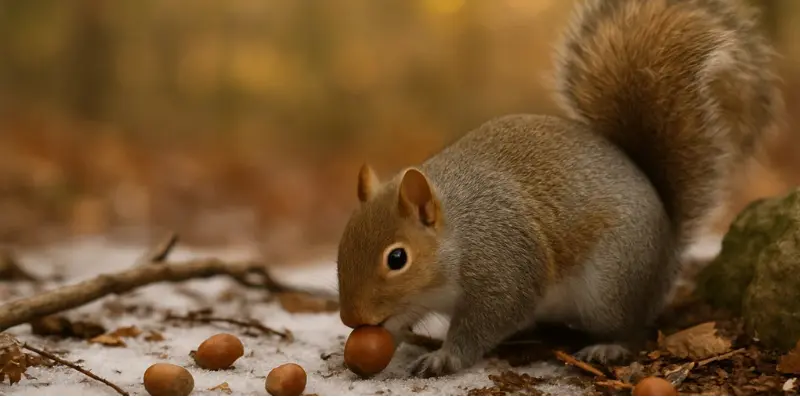How Do Squirrels Find Food?
Published: 28 Jul 2025

Squirrels are smart, quick, and excellent foragers. Whether you spot one darting through trees or digging holes in your backyard, they’re usually on a mission to find or store food. But how do squirrels find food, especially when they’ve hidden it months before or it’s buried under snow?
In this article, we’ll explore the fascinating ways squirrels locate, store, and remember their food. You’ll learn how they use their senses, what they eat, how they prepare for winter, and even how baby squirrels learn the tricks of foraging. Let’s dive into the world of squirrel survival.
How Do Squirrels Find Food in the Wild?
Squirrels don’t just stumble upon food by chance—they actively search for it every day. This routine is called squirrel foraging behavior, and it plays a big role in their daily life. Most squirrels spend several hours each day looking for something to eat or bury.
They use their sharp eyesight to scan trees and the ground for potential food. Their keen hearing helps them detect movements like a nut falling or a rival squirrel nearby. These natural squirrel instincts guide them through forests, parks, and even busy neighborhoods as they search for meals.
Their intelligence and problem-solving skills help them access hard-to-reach food, like bird feeders or nuts inside tough shells. Squirrels are also very curious, which encourages them to explore new food sources.
What Do Squirrels Eat in the Wild?
A squirrel’s diet changes depending on the season and where they live. They’re omnivores, which means they eat both plant and animal-based foods.
Here’s what they usually eat in the wild:
- Nuts – Acorns, walnuts, hazelnuts, pecans
- Seeds – From pinecones, sunflowers, and grasses
- Fruits & Berries – Apples, berries, grapes, and more
- Fungi – Mushrooms and truffles (even toxic ones that don’t affect them)
- Tree Bark and Twigs
- Insects and Small Creatures – Grubs, caterpillars, and occasionally small birds or eggs
This diverse squirrel diet helps them stay energized, build fat reserves, and prepare for harsher seasons.
How Do Squirrels Locate Food in Winter?
Winter is the toughest time for squirrels. Food is harder to find, trees are bare, and the ground is frozen. Yet, squirrels continue to survive thanks to clever strategies and planning ahead.
Can Squirrels Find Food Under Snow?
Yes—squirrels are amazing at finding food hidden beneath snow. They often return to caches they buried during the fall, even when they’re covered by several inches of snow. Using their powerful sense of smell, they can detect nuts buried under cold, frozen layers.
This shows just how well-adapted squirrels are when it comes to seasonal food search and winter survival. In fact, some squirrels will even dig through snow in several places before finding their exact cache.
Squirrels also change their behavior in winter. They become less active, only coming out for short periods to save energy. They rely heavily on food they stored earlier in the year.
Caching Behavior in Squirrels
One of the most fascinating parts of squirrel behavior is caching—the act of hiding food for future use. This helps them survive when fresh food is scarce, especially in winter.
Why Do Squirrels Bury Food?
Squirrels bury food to save it for later. This habit is known as nut hoarding, and it’s one of the most important food storage behaviors seen in animals in the wild. Instead of keeping all their food in one place, squirrels spread it out—this is called scatter hoarding. It protects them from losing everything to thieves or bad weather.
How Do Squirrels Store Food for Winter?
When squirrels find a nut or seed, they often dig a small hole, place the food inside, and cover it with dirt or leaves. These caches are carefully placed near landmarks like rocks, tree trunks, or fences so they can be found later.
They also store food in tree crevices, under logs, or in the forks of branches. The most common items they store include:
- Acorns
- Walnuts
- Pine nuts
- Mushrooms (sometimes placed on tree branches to dry)
This behavior is key to their winter survival strategies.
How Do Squirrels Find Nuts They Buried?
It might seem impossible, but squirrels can locate many of the nuts they buried weeks or even months earlier.
Do Squirrels Use Smell to Find Food?
Yes—squirrels have an excellent sense of smell. They can sniff out buried food through soil, snow, and leaves. This is especially helpful when other cues aren’t available.
Do Squirrels Find Food by Memory?
Also yes. Squirrels use spatial memory to remember the general location of their caches. They don’t always recall the exact spot, but they remember the area and use landmarks to help guide them.
Some squirrels even use acorn detection techniques where they slightly alter the soil or mark their cache using their scent. They may dig a few test holes around the area to help jog their memory or smell out the right spot.
While they don’t find every buried nut, they do recover a significant amount—which keeps them alive during food shortages.
The Role of Memory and Smell in Finding Food
So, how do squirrels remember where they buried food? The answer lies in their impressive memory and nose.
Squirrels use:
- Spatial memory to build a mental map of where they’ve cached food
- Landmarks like rocks, trees, or buildings as reference points
- Smell to zero in on the exact location
They combine all these skills, showing just how advanced animal navigation skills can be in the wild. This ability is especially important in areas with heavy snow or shifting landscapes.
How Far Do Squirrels Travel to Find Food?
Squirrels will go wherever they need to for food—but they also stay cautious to avoid predators. On average, squirrels will travel between 50 to 300 meters from their nest to find food. Some will go even farther if food is scarce.
Factors that influence travel distance include:
- Availability of food
- Season (they travel more in fall)
- Competition from other squirrels or animals
- Safety of the area
Even when they travel far, squirrels tend to cache food near safe zones like their nest or familiar trees. They avoid open spaces where predators may be lurking.
How Do Baby Squirrels Learn to Find Food?
Squirrel kits (babies) don’t know how to forage on their own at first. They stay in the nest for several weeks, learning by watching their mother.
How Do Baby Squirrels Learn to Find Food?
- Observation – They watch adult squirrels dig, store, and eat.
- Practice – They play and imitate foraging behaviors.
- Experience – As they grow, they start foraging short distances alone.
Through trial and error, they develop their own rodent food habits, learn how to recognize edible items, and begin caching behavior. This early learning is crucial for survival.
How Do Squirrels Forage for Food in Trees and on the Ground?
Squirrels are highly adaptable and forage in multiple environments.
- In trees – They look for nuts like acorns, fruits, and tree buds. They also steal from bird nests or feeders.
- On the ground – They dig for buried food, search under leaves, and scavenge on the forest floor for mushrooms, seeds, or insects.
Their agility allows them to climb high into trees while still being fast and alert on the ground. This flexibility gives them a big advantage in finding food.
What Methods Do Squirrels Use to Find Food?
To survive, squirrels rely on many techniques. These include:
- Using smell to locate hidden or buried food
- Relying on memory to remember where they’ve cached nuts
- Learning from experience and watching others
- Using instincts passed down through generations
- Adapting to seasons, especially winter
So if you’ve ever wondered, “What methods do squirrels use to find food?” – now you know it’s a smart mix of senses, memory, and planning.
Conclusion
So, how do squirrels find food? They use every tool available: a sharp nose, a good memory, instincts, and learned behavior. Their ability to store food for winter and return to it weeks later shows just how clever and adaptable these little creatures are.
Whether they’re burying acorns in your yard or climbing a tree for a snack, squirrels remind us of the intelligence and survival skills found in even the smallest wildlife.

- Be Respectful
- Stay Relevant
- Stay Positive
- True Feedback
- Encourage Discussion
- Avoid Spamming
- No Fake News
- Don't Copy-Paste
- No Personal Attacks

- Be Respectful
- Stay Relevant
- Stay Positive
- True Feedback
- Encourage Discussion
- Avoid Spamming
- No Fake News
- Don't Copy-Paste
- No Personal Attacks





